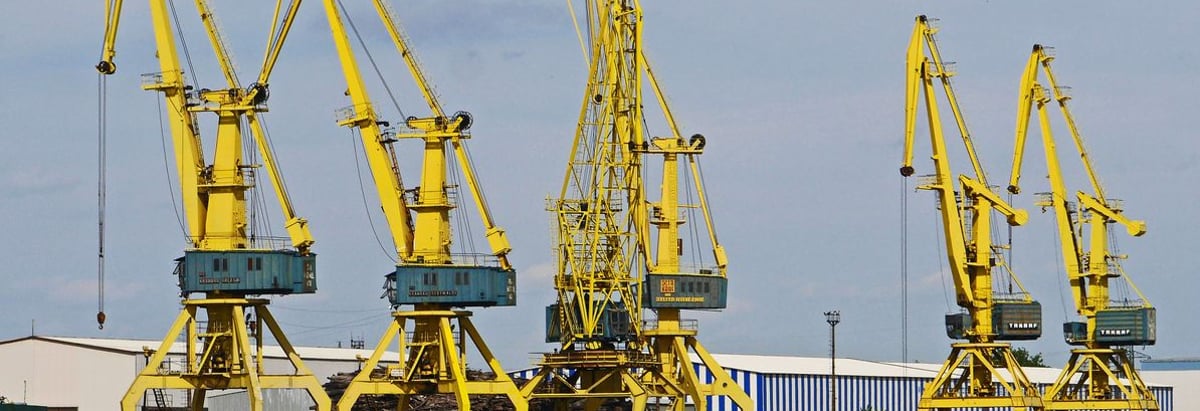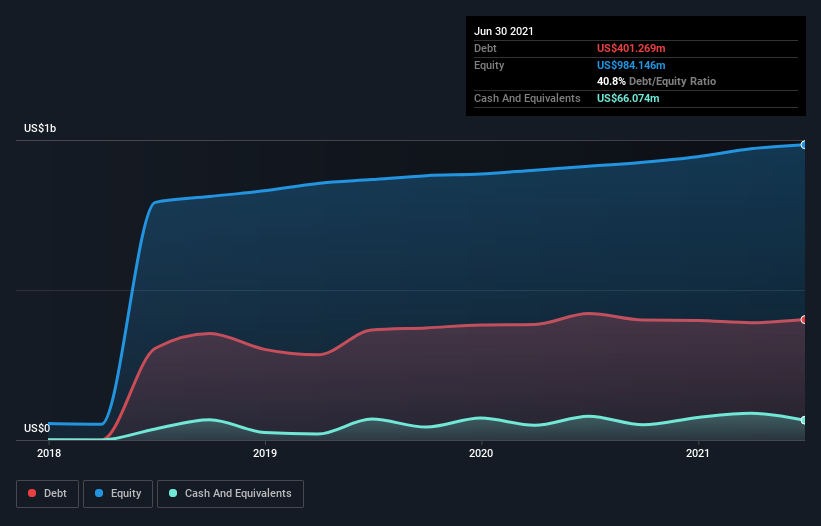- United States
- /
- Energy Services
- /
- NasdaqCM:NESR
National Energy Services Reunited (NASDAQ:NESR) Has A Somewhat Strained Balance Sheet

David Iben put it well when he said, 'Volatility is not a risk we care about. What we care about is avoiding the permanent loss of capital.' So it might be obvious that you need to consider debt, when you think about how risky any given stock is, because too much debt can sink a company. We can see that National Energy Services Reunited Corp. (NASDAQ:NESR) does use debt in its business. But the real question is whether this debt is making the company risky.
When Is Debt A Problem?
Debt is a tool to help businesses grow, but if a business is incapable of paying off its lenders, then it exists at their mercy. In the worst case scenario, a company can go bankrupt if it cannot pay its creditors. However, a more frequent (but still costly) occurrence is where a company must issue shares at bargain-basement prices, permanently diluting shareholders, just to shore up its balance sheet. Having said that, the most common situation is where a company manages its debt reasonably well - and to its own advantage. When we think about a company's use of debt, we first look at cash and debt together.
View our latest analysis for National Energy Services Reunited
How Much Debt Does National Energy Services Reunited Carry?
The image below, which you can click on for greater detail, shows that National Energy Services Reunited had debt of US$401.3m at the end of June 2021, a reduction from US$421.6m over a year. However, it does have US$66.1m in cash offsetting this, leading to net debt of about US$335.2m.

A Look At National Energy Services Reunited's Liabilities
According to the last reported balance sheet, National Energy Services Reunited had liabilities of US$354.8m due within 12 months, and liabilities of US$368.0m due beyond 12 months. Offsetting these obligations, it had cash of US$66.1m as well as receivables valued at US$253.7m due within 12 months. So it has liabilities totalling US$403.0m more than its cash and near-term receivables, combined.
While this might seem like a lot, it is not so bad since National Energy Services Reunited has a market capitalization of US$1.09b, and so it could probably strengthen its balance sheet by raising capital if it needed to. However, it is still worthwhile taking a close look at its ability to pay off debt.
We measure a company's debt load relative to its earnings power by looking at its net debt divided by its earnings before interest, tax, depreciation, and amortization (EBITDA) and by calculating how easily its earnings before interest and tax (EBIT) cover its interest expense (interest cover). Thus we consider debt relative to earnings both with and without depreciation and amortization expenses.
National Energy Services Reunited's net debt is sitting at a very reasonable 1.8 times its EBITDA, while its EBIT covered its interest expense just 4.6 times last year. It seems that the business incurs large depreciation and amortisation charges, so maybe its debt load is heavier than it would first appear, since EBITDA is arguably a generous measure of earnings. Sadly, National Energy Services Reunited's EBIT actually dropped 5.7% in the last year. If earnings continue on that decline then managing that debt will be difficult like delivering hot soup on a unicycle. There's no doubt that we learn most about debt from the balance sheet. But ultimately the future profitability of the business will decide if National Energy Services Reunited can strengthen its balance sheet over time. So if you want to see what the professionals think, you might find this free report on analyst profit forecasts to be interesting.
But our final consideration is also important, because a company cannot pay debt with paper profits; it needs cold hard cash. So we clearly need to look at whether that EBIT is leading to corresponding free cash flow. In the last three years, National Energy Services Reunited's free cash flow amounted to 34% of its EBIT, less than we'd expect. That weak cash conversion makes it more difficult to handle indebtedness.
Our View
While National Energy Services Reunited's conversion of EBIT to free cash flow makes us cautious about it, its track record of (not) growing its EBIT is no better. At least its net debt to EBITDA gives us reason to be optimistic. Taking the abovementioned factors together we do think National Energy Services Reunited's debt poses some risks to the business. So while that leverage does boost returns on equity, we wouldn't really want to see it increase from here. There's no doubt that we learn most about debt from the balance sheet. But ultimately, every company can contain risks that exist outside of the balance sheet. For example, we've discovered 3 warning signs for National Energy Services Reunited that you should be aware of before investing here.
If you're interested in investing in businesses that can grow profits without the burden of debt, then check out this free list of growing businesses that have net cash on the balance sheet.
When trading National Energy Services Reunited or any other investment, use the platform considered by many to be the Professional's Gateway to the Worlds Market, Interactive Brokers. You get the lowest-cost* trading on stocks, options, futures, forex, bonds and funds worldwide from a single integrated account. Promoted
Valuation is complex, but we're here to simplify it.
Discover if National Energy Services Reunited might be undervalued or overvalued with our detailed analysis, featuring fair value estimates, potential risks, dividends, insider trades, and its financial condition.
Access Free AnalysisThis article by Simply Wall St is general in nature. We provide commentary based on historical data and analyst forecasts only using an unbiased methodology and our articles are not intended to be financial advice. It does not constitute a recommendation to buy or sell any stock, and does not take account of your objectives, or your financial situation. We aim to bring you long-term focused analysis driven by fundamental data. Note that our analysis may not factor in the latest price-sensitive company announcements or qualitative material. Simply Wall St has no position in any stocks mentioned.
*Interactive Brokers Rated Lowest Cost Broker by StockBrokers.com Annual Online Review 2020
Have feedback on this article? Concerned about the content? Get in touch with us directly. Alternatively, email editorial-team (at) simplywallst.com.
About NasdaqCM:NESR
National Energy Services Reunited
Provides oilfield services in the Middle East and North Africa region.
Flawless balance sheet and undervalued.
Similar Companies
Market Insights
Community Narratives



